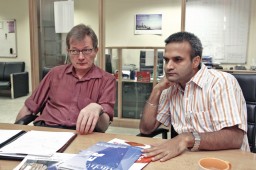
The German Technical Corporation (GTZ) has partnered with SIDBI in India for various initiatives to support the MSMEs in the textile and apparel industry to face both current and future challenges. Going forward, the area of focus is skill development and responsible competitiveness.
The Micro Small and Medium Enterprises (MSMEs) have been accepted globally as the engine of economic growth and for promoting equitable development since the sector has huge employment potential at low capital cost. In fact the MSMEs constitute over 90% of total enterprises in most of the economies and are credited with generating the highest rates of employment growth while also accounting for a major share of industrial production and exports.
In India too, the MSMEs play a pivotal role in the overall industrial economy of the country. It is estimated that this sector employs around 59.7 million persons spread over 26.1 million enterprises. In terms of value, MSME sector accounts for about 45% of the manufacturing output and around 40% of the total export of the country.
The textile and clothing industry which accounts for over 35 million jobs with projected requirement of another 12 million by 2012 too comprises of innumerable small & medium size players which though collectively generate huge employment are often overlooked in the larger context of development. As a commitment to facilitate growth through increased competitiveness of Small & Medium Enterprises (SME) in India, SIDBI has implemented a multi donor project for the financing and development of SMEs under the aegis of Department of Financial Services, Ministry of Finance, Government of India. German Technical Corporation (GTZ) is one of the international partners of this project on behalf of the German Federal Ministry for Economic Cooperation and Development (BMZ).
GTZ has been actively involved in India for more than 50 years and is facilitating interventions in multiple areas to initiate a change process on how the businesses of SMEs are being run currently. Its key area of work is ‘skill development’ and greater awareness to ‘responsible competitiveness’.
Though the GTZ has been actively involved in India for more than 50 years, with focus on sectors that are important to the growth story of India in terms of employment potential or those sectors which are the sunrise industries, it is only with this project initiated three years ago that clear and focused attention has been made on the garment sector. Through its various initiatives, GTZ is facilitating interventions in multiple areas to initiate a change process on how the businesses of SMEs are being run currently and to also re-orient the industry towards responsible competitiveness.
Besides supporting the operational level improvement process, GTZ also supports the industry through the usage of ICT to develop new tools, network and knowledge source on emerging opportunities like energy efficiency, carbon management and market diversification. Going forward the key area of work is ‘skill development’ and greater awareness to ‘responsible competitiveness’.
In an exclusive interaction with Team AO, Manfred Hans Haebig, Private Sector Development Director and Amit Kumar, Senior Technical Expert-BDS, GTZ underline the strategy for involvement in the garment industry.
“We are spending German tax payers money and the initiatives that we partner with must have a ‘public good agenda’ while imbibing inclusive growth,” says Manfred. He argues that the garment industry is an interesting and rewarding industry to work with as many objectives are achieved within the same framework. While working on increasing competitiveness of enterprises, the larger goal of creating employment and poverty alleviation are also dealt with since the entry levels are low and raw hands can be easily trained to enter the industry. “With the Government of India setting a target of creating a pool of 500 million skilled people by 2022 as against the current 40 million, the opportunities for us to contribute in the task are many, especially in rural and marginal regions where unemployment and poverty are major concerns,” says Manfred.
Though the GTZ has undertaken training projects earlier, the effort were localized and not to the scale envisaged today. “Skill development has been a neglected area in India and it is only in the last couple of years that it has become a priority,” says Manfred. He has no illusions on the challenges of such an initiative because old methodologies will not work. “We will have to re-invent the whole concept of training to get so many people skilled,” he reasons. The use of ICT will be a major thrust area in devising new methodologies.
With its experiences of working in the garment sector through its various initiatives in the segment, two very strong impressions emerge – one that the Government policies have hindered the growth of scale in the industry, forcing players to grow horizontally; and secondly, the industry itself is not proactive with most players resisting change. “It has been clearly demonstrated by experts/consultants that 10-15% increase in productivity is possible by simply putting the house in order, but how many are actually following the route,” questions Amit. Changes are happening but there is a long way to go, he feels.
Under the project mandate, the major role of GTZ is not to do cluster development, but work with banks/financial institutions to ensure flow of credit to SMEs as facilitators. “We are the bridge between the experts and the industry and our focus is on how we can create dynamics where both can access each other more effortlessly,” says Amit. The Online Network for Consultants and Industries Project, currently under construction is an effort in that direction. Though implementation of findings and directional indications are not within the mandate of the role of GTZ, sometimes the pilot approach is used to demonstrate the advantage of practices highlighted and disseminate the same to the industry. “We always partner with associations/ ministries that have a similar mandate so we can leverage the existing supply chain for long-term gains,” adds Manfred.
Selecting the areas where GTZ would like to contribute is determined by three major factors – what are the current issues of concern, not being addressed by other players; identifying emerging issues to prepare the sector for the future and interest segments of various stakeholders in the project. Manfred however feels that unless the industry participates proactively long-term goals cannot be achieved. “The industry must have a longer vision to get long-term benefits. After all you cannot have good governance without good enterprises,” he concludes.






